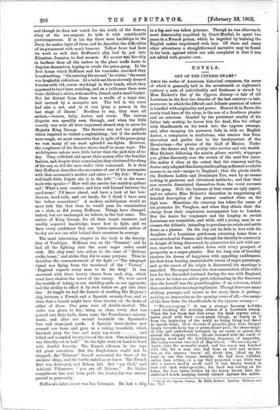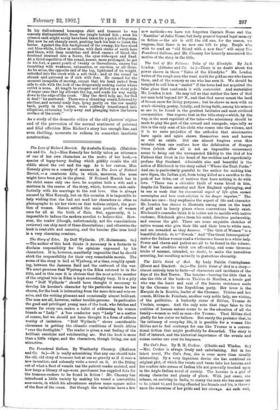NOVELS.
OUT OF 1HE CYPRESS SWAMP * AMID the welter of American historical romances, the scene of which is generally laid in the seventeenth or eighteenth century, a note of individuality and freshness is struck by Miss Rickert's Out of the Cypress Swamp—a tale of old Louisiana in the first two decades of the last century—a tale, moreover, in which the difficult and delicate question of colour is handled with originality and power. Honor6 de la Barre, the sorely tried hero of the story, is the son of a Southern planter and an octoroon. Goaded by the persistent cruelty of his father into mutiny, he leaves him for dead, flies for refuge with bloodhounds on his track into the cypress swamps, and, after escaping his pursuers, falls in with an English doctor, a companion in misfortune, who rescues him from starvation and guides him to the headquarters of the Baratarians,—the pirates of the Gulf of Mexico. Under them the doctor and his prot4ge take service and win wealth. Miss Rickert, following the maxim glisses worlds, n'appuyez
pas, glides discreetly over the events of the next few years. She makes it clear at the outset that the runaway and the
doctor only adopted this disreputable calling as the sole available means to an end—escape to England ; that the pirate chiefs, the Brothers Lafitte and Dominique You, were by no means lacking in generous and chivalrous instincts ; and that their new recruits dissociated themselves from the worst excesses of the gang. Still, the business at best wears an ugly aspect, and we admire Miss Rickert's discretion in suppressing all detailed description of the pirates' conduct when on the high seas. Meantime the runaway has taken the name of his protector Dr. Vaughan, and when they obtain their dis- charge from their employers, accompanies him to London. But the desire for vengeance and the longing to revisit Louisiana are irresistible, and while still a young man he re- crosses the Atlantic, intending to purchase an estate and settle down as a planter. On the way out he falls in love with the daughter of a Louisiana gentleman returning home from a convent school in France, and though his identity is constantly in danger of being discovered, he prosecutes his suit with suc- cess, marries her, and settles down with every prospect of prosperity as a sugar-planter. But the long arm of heredity shatters his dream of happiness with appalling suddenness, his first-born bearing unmistakable traces of negro parentage, and as the secret of his origin is discovered, his marriage is annulled. The sequel traces the slow resurrection of his wife's love for her discarded husband during the war with England, in which he takes an active part, culminating in the discovery that she herself was the granddaughter Df an octoroon, which thus renders their marriage legitimate. Though there are many striking passages and scenes in the story, there is perhaps nothing so impressive as the opening scene of all,—the escape of the hero from the bloodhounds in the cypress swamp :—
" Wo-o-o-o-ng ng !' It was a strange far-away 'bell-like sound breaking the noonday silence of a Louisiana swamp. When the low boom had died away, the dank cypress colon- nades stood with their rusty-green foliage, as lonely as if from the beginning of the world no living thing had dared to invade them; their shrouds of parasitic grey m093 drooped limply towards tut fy bog or green-slimed pool ; the dense tangle of vine and underbrush betrayed by no rustle or quiver the animal life sleeping within; the air steamed with the smell of decaying wood and the bewildering fragrance of magnolias. The sunny recesses were full of May bloom. • Wo-o-o-o-ng-ng ! ' Again Came the mournful sound, and the scone was touched with 1,fe, for a man who had been as still and motion- less as the cypress 'knees' all about him, lifted up his head as one who listens intently. He had been huddled, rather than sitting, on a log that projected acme little way into a narrow muddy creek, until it was finally buried in ooze and rank water-growths ; his head was resting on his knees, the face being hidden by the heavy brown hair, the sunburned hands hanging loosely clasped against the ankles.
• Out of the Cypress Swamp. By Edith Rickert. London: Methuen and Co. r63.1 - -
In his dull-coloured homespun shirt and trousers he was scarcely distinguishable from the jungle behind him ; even his crimson sash might easily have been taken for a patch of begonias. But now he sat sharply erect, pushing back his hair to listen the better. Against the dim background of the swamp, his face stood out blue-white, hollow in outline, with dark stains of earth here and there, with deep scratches and dried smears of blood, the forehead strained into a frown, the eyes wide-open and fixed. At a third repetition of the sound, nearer, more prolonged, he got to his feet, a gaunt youth of twenty or thereabouts, sinewy but trembling with weakness, exhaustion, or emotion, or all three. As he arose, the opposite end of the log, lightened of its weight, subsided into the creek with a soft thud ; and at the sound he shrank and quivered as if sick with fear. He seemed for the moment incapable of moving, except that his head jerked from side to side with the look of one desperately seeking outlet where outlet is none. At length he stooped and picked up a stout pole of sugar cane that lay athwart the log, and made his way warily down to the edge of the creek. May the devil help me, for God is deaf ! 'he muttered. • There was a chunking sound, followed by ahother, and several scaly logs, lying partly on the low muddy bank, partly in the water, were suddenly transformed into alligators, swimming lazily away and plunging below the brown surface of the creek."
As a study of the domestic ethics of the old planters' regime and of the perversion of the normal sentiment of paternal and filial affection Miss Rickert's story has enough fine, and even thrilling, moments to redeem its somewhat inartistic construction.











































 Previous page
Previous page